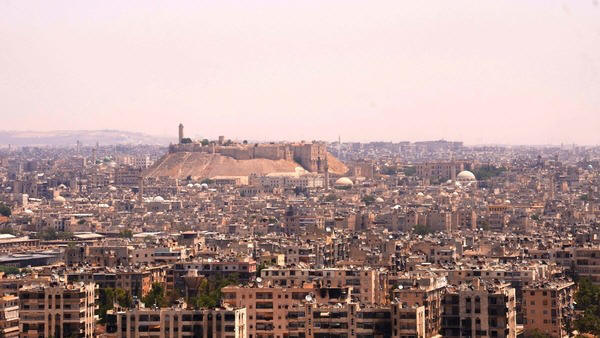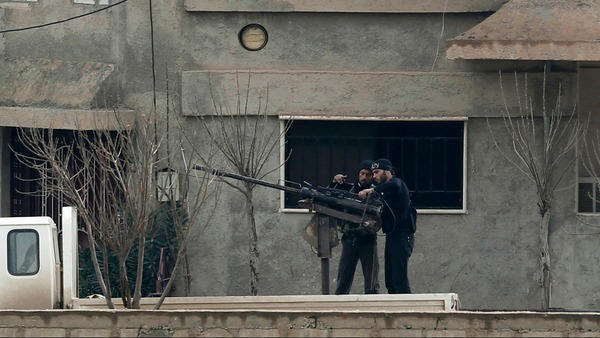www.aljazeerah.info
News, July 2013
Archives
Mission & Name
Conflict Terminology
Editorials
Gaza Holocaust
Gulf War
Isdood
Islam
News
News Photos
Opinion Editorials
US Foreign Policy (Dr. El-Najjar's Articles)
www.aljazeerah.info
|
Editorial Note: The following news reports are summaries from original sources. They may also include corrections of Arabic names and political terminology. Comments are in parentheses. |
5,000 Syrians Killed Monthly, 6,000 Flee the Country Daily Because of the Civil War
July 17, 2013
 |
 |
| Al-Zibdeh and Jisr Al-Haj neighborhoods of Aleppo, which are controlled by the Free Syria Army | Two fighters of the Free Syria Army near the border with Turkish town of Ceylanpinar |
Turkish teen killed by gunfire from Syria border clashes
Al-Arabiya, Wednesday, 17 July 2013
AFP, Instanbul
A 17-year-old Turk died as a result of initial gunfire injuries in a southeastern town on Wednesday after being hit by stray gunfire coming across the border from war-torn Syria, Turkish media reported.
Mahsun Ertugrul died in hospital after receiving a gunshot to the chest in the small Turkish border town of Ceylanpinar on Tuesday, Dogan news agency said.
A 15-year-old boy from the same town was in intensive care after being struck in the head by a bullet from Syria, it added.
Ceylanpinar lies across from the northern Syrian town of Ras al-Ain where rebels from the Free Syrian Army have been clashing with Kurdish fighters loyal to the Democratic Union Party (PYD), Syria’s branch of the Kurdistan Workers’ Party (PKK).
Spillover from the fighting, including ricocheting bullets, has injured numerous civilians on the Turkish side in recent months.
Kurds comprise 10 percent of Syria’s total population, with most living in the north of the embattled country.
Since the outbreak of the revolt against President Bashar al-Assad more than two years ago, most Kurds have tried to ensure that their areas remained violence-free.
Last summer, Assad’s forces withdrew from majority Kurdish areas, and Kurdish militia became responsible for security there.
Although many Kurds feel hostile to a regime that has oppressed them for decades, they have also tried to keep the rebels out of the areas they control in order to avoid sparking a confrontation with the army.
The death of the teenage boy sparked anger in Ceylanpinar, where locals tried to prevent an injured Syrian who was evacuated to Turkey from being taken to hospital before being dispersed by police, Dogan said.
***Syria rebels reinforce key suburb in Damascus battle
Al-Arabiya, Tuesday, 16 July 2013
Reuters, Beirut --
Syrian rebels poured reinforcements into a key Damascus suburb on Tuesday in an attempt to push back government troops who have renewed their campaign to secure the capital and build on battlefield gains elsewhere in the country.
Fighting centered on Qaboun, a rebel-held district where Syrian
troops backed by tanks and artillery had made inroads on Monday as part
of efforts to consolidate control over Damascus, President Bashar
al-Assad's power base.
After two years of rebel gains in a war
that has cost more than 90,000 lives, the tide has turned somewhat for
Assad's forces, allowing them to seize the city of Qusayr last month and
press on with a campaign to link Damascus to Assad's coastal
strongholds.
In facing down the mainly Sunni rebels seeking to
oust him, the Syrian leader has received important backing from Shi'ite
Iran and from Iranian-backed Hezbollah fighters from Lebanon as the war
takes on an increasingly sectarian aspect.
At the same time, the
rebels are plagued by infighting between Islamist fighters and members
of the more liberal Free Syrian Army, which is backed by the West and
some Arab nations.
Assad's forces are pressing their campaign at
a time when the Free Syrian Army has yet to receive weapons promised by
Washington but delayed by objections by U.S. lawmakers.
A U.S.
official said on Monday that the Obama administration had made progress
in overcoming these concerns but some details remained unresolved.
Both Republican and Democratic lawmakers fear the weapons could end
up in the hands of Islamist militants, and would not be enough to tip
the balance against the better-equipped Syrian government anyway.
Chemical weapons
Britain, meanwhile, said it would give Syrian rebels equipment to
protect themselves against chemical and biological weapons as "a matter
of special urgency".
Britain has said forces loyal to Assad have
made limited use of chemical weapons, something the Syrian government
denies.
In an attempt at unity, the Syrian opposition now intends
to create a 10-member executive council that can to draw together
disparate factions into a more structured army with better financing and
weapons, Michel Kilo, a senior opposition figure, told Reuters in Paris.
In Damascus, the latest fighting comes almost a year after one of
the rebels' most spectacular attacks in the capital – a bomb attack last
July 18 which killed several of Assad's most senior security officials.
Abu Nidal, a rebel spokesman in Damascus, said on Tuesday that his
fighters were trying to prevent the army advancing further into Qaboun,
which it entered on Monday.
"Rebel reinforcements are entering
the area," he told Reuters by Skype. "We expect the army to advance
further into the area but they will be stopped."
The intensity of
the fighting could be seen in footage posted on the internet by
opposition activists.
The amateur video showed a large grey plume
of smoke rising from a densely built residential area of Damascus. Mount
Qasioun, which overlooks the capital, can be seen in the background.
Text accompanying the footage posted on Tuesday said the smoke came
from a ground-to-ground missile fired into Qaboun.
Army checkpoint
Elsewhere in the city, nine people including a child were killed at
an army checkpoint, the Syrian Observatory for Human Rights said in a
statement. Quoting activists in the area, the British-based group said
they were all shot in the head.
It added that mortar bombs were
being fired by the army into the southern district of Yarmouk, a
Palestinian refugee camp on the edge of central Damascus that has fallen
in and out of government and rebel control during the past year.
Activists and residents said also that at least five mortar shells hit
the Damascus neighbourhood of Masaken Barze, injuring several people.
Clashes and bombardment were reported by activists in nearly every
province on Tuesday, from central Homs city to the northwestern farming
province of Idlib to the eastern desert city of Deir al-Zor.
In
the south of Syria near the Israeli border, the Observatory reported
fierce clashes between rebels and government forces in the village of
al-Qahtaniya.
"Initial reports indicate that several fighters in
the regime forces were killed, and some armored vehicles were
destroyed," the Observatory said.
In western Homs province,
gunmen loyal to Assad shot dead at least six mediators sent to try to
reconcile warring sectarian groups in an area where people on opposing
sides in Syria's war had until now been able to coexist, residents said.
The killings on Monday evening in the village of Hajaral-Abyad
highlight the growing challenge of mediating between towns held by rebel
groups and those controlled by pro-Assad militias known as "shabbiha".
U.N. says 5,000 a month dying in worsening Syria war
Al-Arabiya, Tuesday, 16 July 2013
AFP, United States
Five thousand people a month are dying in the
Syria war which has now thrown up the worst refugee crisis since the
1994 Rwandan genocide, U.N. officials said Tuesday.
A host of top
officials called on the divided U.N. Security Council to take stronger
action to deal with the fallout from the 26 month old civil war in which
the United Nations says up to 100,000 people have died.
“The
extremely high rate of killings nowadays -- approximately 5,000 a month
-- demonstrates the drastic deterioration of the conflict,” U.N.
assistant secretary general for human rights Ivan Simonovic told a
council meeting on Syria.
Nearly 1.8 million people are now
registered with the United Nations in countries around Syria and an
average of 6,000 people a day are now fleeing, U.N. High Commissioner
for Refugees Antonio Guterres added.
“We have not seen a refugee
outflow escalate at such a frightening rate since the Rwandan genocide
almost 20 years ago,” Guterres said.
“This crisis has been going
on for much longer than anyone feared with unbearable humanitarian
consequences,” he added.
U.N. humanitarian chief Valerie Amos
said the international community may have to consider cross border
operations to get aid into Syria.
Syria's U.N. ambassador Bashar
Jaafari disputed the U.N. death toll figures as “unprofessionally
sourced.”
Fair Use Notice
This site contains copyrighted material the
use of which has not always been specifically authorized by the copyright
owner. We are making such material available in our efforts to advance
understanding of environmental, political, human rights, economic,
democracy, scientific, and social justice issues, etc. We believe this
constitutes a 'fair use' of any such copyrighted material as provided for
in section 107 of the US Copyright Law. In accordance with Title 17 U.S.C.
Section 107, the material on this site is
distributed without profit to those
who have expressed a prior interest in receiving the included information
for research and educational purposes. For more information go to: http://www.law.cornell.edu/uscode/17/107.shtml.
If you wish to use copyrighted material from this site for purposes of
your own that go beyond 'fair use', you must obtain permission from the
copyright owner.
|
|
|
|
||
|
||||||


